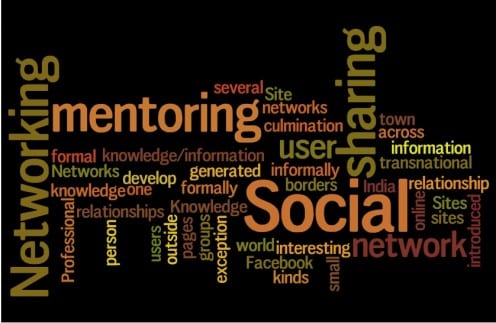Mentoring across borders
By Shriram Venkatraman, on 13 October 2013
A social network consists of several kinds of networks, and a knowledge network is one of them. While knowledge sharing and/or information sharing happens both formally and informally on social networking sites, some of them have formal user groups and pages dedicated to sharing knowledge/information (all user generated). The users get introduced through the network and sometimes even develop relationships outside the online social networking site, which could be of various kinds, mentoring relationships being one of them. Social networking sites such as Facebook are not an exception to this. This becomes all the more interesting when a person from a small town in India gets in touch with a professional on the other side of the world and is provided with mentoring across borders, in other words transnational mentoring, all through Facebook.
Recently I met with an informant who benefited by this knowledge network on Facebook. This person is from a very humble background and worked very hard to graduate with a MBA, majoring in finance. His college is very close to the field site and this ensured that he never really moved out of this area until he joined a bank in their financial product sales team after graduating from his MBA. He seems to have become interested in the number crunching that finance as a subject offered him. He was quickly disillusioned with the job, as it involved more smooth-talking rather than the number crunching that he had hoped for. Not giving up, he initially tried to advise his friends from the neighbourhood on their financial planning but didn’t find many enthusiastic takers for his suggestions.
Disappointed, he turned to the internet and chanced upon a Facebook group that had people from all over the world discussing and sharing knowledge on financial concepts. Enthused by this discovery, he carefully followed the discussion and was struck by the suggestions given by a particular discussant from Germany. My respondent started corresponding with this person and found that he was a senior financial analyst in a stock brokerage firm in Germany. Thus began a deep friendship that progressed from talking about debentures, futures, options and equity to career goals and aspirations. The analyst from Germany became a mentor to my respondent and inspired him enough to quit his job and set up his own stock brokerage firm. This firm was started with the blessings of the mentor who provided my respondent with the necessary knowledge support and a list of the required software. Where possible, he also provided the software itself for the start up. My respondent managed to procure the necessary funding and the rest of the software with some of the latter being sourced as pirated versions. The firm runs from his humble two bedroom home in the field site which he shares with his parents and two younger brothers. He claims that his life has become much better and he now has support (international knowledge and moral support) to follow his dreams.
I was particularly struck by the true globalization that took place through a social networking site!
 Close
Close





